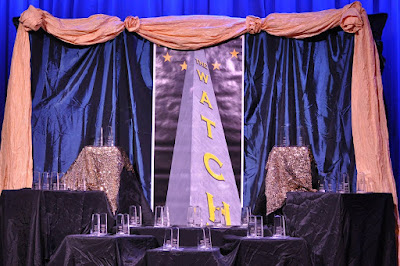Vanya and Sonia and Masha and Spike- meet cast member Lorraine Bouchard
Even
when we are adults, our families shape us. We learn to fend for ourselves
through vicious sibling rivalry. We also find them to be our most loyal
cheerleaders. Masha and Sonia are cheerleaders for Vanya's strange play. Vanya
cheers on Sonia standing up for herself, and for being outgoing at the
party.
And nobody can hurt us or love us like a brother or sister. Truth hurts, and siblings don't pull punches.
And nobody can hurt us or love us like a brother or sister. Truth hurts, and siblings don't pull punches.
At
first, I saw Sonia as described by her sister: "sweet, sensitive, tedious
Sonia. You can't face life, can you?" But it is Sonia's anger at this
sister's condescending truth-telling that finally impels her out of her
numbness to stand up for herself and literally step out of her shell. It is
wonderfully ironic that it is the condescending and self-absorbed Masha who
becomes Sonia's savior.
This
family reminds us that support is not just about money, like the money that
Masha spends on the house and everything that goes along to support Vanya and
Sonia. Sonia never acknowledges all that Masha has done to take care of
everything concerning a roof over their heads and food on the table. What Sonia
craves is attention from her big sister. She wanted Masha to answer the phone
or check in on them, but Masha was off "gallivanting, having a life."
"You just left us here!" is Sonia's aching complaint.
Hope
and hopelessness intermingle in the play, providing a compelling tension. Sonia
has no hope in the beginning. She is afraid to hope. When Nina arrives,
"full of youthful hope and enthusiasm," Masha wonders "if it
makes it hard for older people to be around you." The three siblings are
in their twilight years, and they are wondering what there is to live for.
Nina's enthusiasm is comic in contrast to the world-weariness of her elders,
and Nina's admonition that "You must always hope" is seen by Sonia as
"wise, but scary." It *is* scary to hope, because we can be
disappointed. But without hope, without the promise of cherry orchards to
blossom in the spring, what is there to live for?
Sonia's
phone monologue with Joe is a challenging piece because of this intermingling of
hope and hopelessness. Sonia has longed for just such an encounter, but when
confronted with the possibility of actually going to dinner with a surprise
admirer, she is petrified. He probably won't like her, it's probably just
dinner, there must be something wrong with him. How do I show that fear and
that hope without looking like the bipolar person that Vanya accuses her of
being?
I
also love that Sonia is not just sweet and sensitive; she is snarky and has a
dry sense of humor. It's great that Masha seldom catches on to this.
Another
thing I've noticed about this play is the nature of apologies. Which apologies
are sincere? After each of Sonia's apologies, she injects an excuse or a
demand. Is she merely apologizing as a form of social lubricant so that people
will hear her complaint? Does Masha mean her apology when she acknowledges
offending Sonia? Does Vanya mean his apology for complaining about the coffee?
It seems that apologies may unruffle feathers --a little-- but it is the biting
truth that gives us wings.
On
the hobby of acting in community theatre
While
I am at rehearsals or on stage, I cannot think about my life outside. It is a
step away that allows me to let go of the challenges of my job or the events in
my personal life. It keeps me from staying too long at the office. In December,
between performances of a show that I was in, I got the call that my husband
had died. The camaraderie of the cast and crew made it bearable. I took this
part in this show despite the fact that it would mean that I could not be there
for the birth of my grandson, and I took it after getting my daughter's
blessing that she would be OK with that. My life outside the theatre brings
depth to my characters, but my life *in* the theatre brings levity and
perspective. It is a gift to be able to walk around in another person's skin
because I see it as a way to love others by getting to know them intimately.
Acting is about intimacy. When you can really feel that person, you can make
others feel them too. My goal as an actor is twofold: to give others the
feelies, and to make them think.
I
had done a lot of theatre from age 12 through 24, then stopped when my daughter
was born and my career was demanding. I certainly missed it, but the time away
gave me a more pleasurable theatre experience because I finally stopped
analyzing and criticizing every production: I could simply ride along as a
captivated audience member. But after she flew from the nest, and after I
walked across the stage with my doctorate degree at the age of 45, I promised
myself that I would return to doing something just for me: I would return to theatre.
I was lucky to work with a number of theaters in Houston as well as in Florida,
South Dakota, and in this DMV area. The vibrant theatre scene here is a big
factor in what drew me to return after moving around the country. I am now
trying to break into doing voiceover work, too.




Comments
Post a Comment